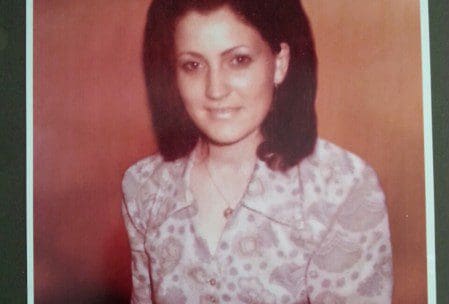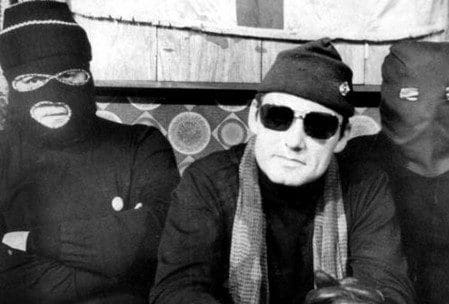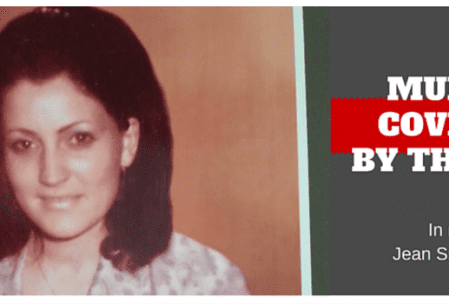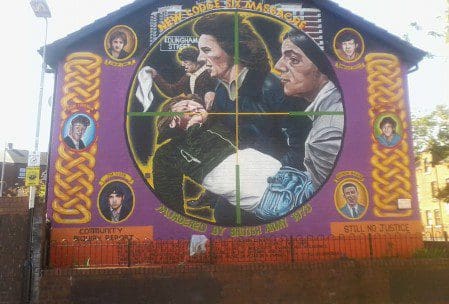A secret but seemingly innocuous British Ministry of Defence (MOD) file discussing a civil litigation case in 1975, not only confesses that a serious crime was carried out as part of Special Force duties, but also records how casual cover-up permeated the British system.
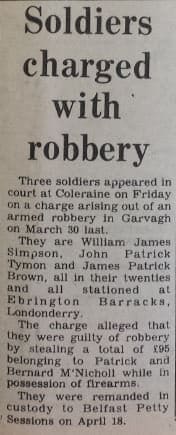

The British archive (Loose Minute A/79/Gen/4132) relates to this armed robbery and a further claim for compensation against the Ministry of Defence for assault and battery made on behalf of Mrs Mary McNicholl the following year. The McNicholl household was “one of the two households robbed by the men” and two of the soldiers, Lance corporal Simpson and Ranger Tymon, were then serving six-year terms of imprisonment [2].
Special Forces
The document, entitled Northern Ireland Civil Litigation: Mary McNicholl v MOD was written to the Assistant Private Secretary of Secretary of State for Defence, Labour’s Roy Mason during the period.
Its distribution list includes heads of the various MOD departments running the British war machine in the north of Ireland at the time such as MO4 and Defence Secretariat 10 (DS10). The document is signed as-read by the Vice Chief of General Staff who is deputy to the professional head of the British Armed Forces and highest ranking uniformed adviser to the British Prime Minister. Copies have also been sent to the personal secretaries of the Minister of State and Under Secretary of State for Defence.
So it was written for the attention of the élite of the Ministry of Defence and begins:
“… you said that the Secretary of State would like to be kept informed of developments over the two soldiers who withdrew from the SAS to join the SRU in Northern Ireland and who were prosecuted in connection with two armed robberies.”
This is startling for a number of reasons, and not only because of their crime against a family.
Firstly, they are not ordinary British soldiers. Tymon and Simpson are members of the élite Special Air Service (SAS), and were then serving with the Special Reconnaissance Unit (SRU) which operated under the cover name of Northern Ireland Training and Advisory Teams (Northern Ireland) – NITAT(NI) [3].
A Defensive Brief [4] prepared for a meeting of the British Prime Minister and Taoiseach on 5th April 1974 tells us, though, that the SRU was created when:
“In 1972 the operations of the MRF [Military Reaction Force] were brought under more centralised control and a higher standard of training.”
Plausible Deniability
Contained in the same brief is a statement by British Headquarters Northern Ireland to the Irish Department of Foreign Affairs which stipulates:
“It has been alleged from time to time that murders and other major crimes committed in Northern Ireland have been the work of the SAS. Clearly the terrorist organisations have found it convenient to encourage this belief as a means of evading the responsibility which is properly theirs.
The facts are as follows.
No SAS unit has been or is stationed in Northern Ireland.”
The Defensive Brief expands:
“Men who have served with the SAS are serving in the SRU but no SAS units are operating in Northern Ireland. One officer and 30 soldiers serving with the SRU since early January are due to resume service with 22 SAS by 7 April.”
That Tymon and Simpson “withdrew” from the SAS shows how Britain had plausible deniability when its Special Forces operated in the north of Ireland.
Special Duties
What is most disquieting though is that these Special Force operatives were not off-duty.
The record on the civil litigation discussed:
“Where an injury has been caused by off-duty soldiers the MOD would deny liability and leave the plaintiffs to take action against the individual if they chose. Equally, in any criminal proceedings where the alleged offence was committed by an off-duty soldier, we would not take responsibility for his legal defence. You will remember that in this case, however, it was decided that Simpson, exceptionally, should be defended at public expense to reduce the risk of disclosure of the SAS/SRU connection and SRU operations. Tymon was assisted through the Legal Aid scheme, and did not need defence at our expense, and it was thought inadvisable in the circumstances to give no assistance to Simpson.”
The civil litigation though sought to make the MOD liable which it would be if their soldiers were acting under orders.
This file admits they were, and every single high-ranking person and department on it distribution list knew that too.
“… it is interesting that the Civil Bill is against the MOD rather than the individual ex-soldiers. The plaintiff’s solicitors might have done this because they think MOD will settle to avoid embarrassment since they presumably know the soldiers were (as reported at the trial) on “special duties”… but if we do settle we shall be very vulnerable…
On the other hand, Simpson and Tymon have never claimed that they were acting under orders nor have they volunteered any sensitive information so far. Both are of course aware of their responsibilities under the Official Secrets Act, and are also aware that disclosure of their Service background may well put their families at risk.”
So even though Tymon and Simpson were on “special duties” for the British Army which included robbery and alleged assault and battery of a family, it seems they kept quiet and took what the court threw at them after their arrest.
This record shows that they were going to have to take it on the chin again for queen and country:
“In conclusion, we consider that the present action against the MOD should be defended and that we should handle this case as we would any other, and that Simpson and Tymon must take their chance if proceedings are subsequently initiated against them. To settle this case would place MOD in an untenable position. The Crown Solicitor for Northern Ireland, and HQNI agree.”
The cover-up had strong supporters as well as casual witnesses.
Questions Remain:
– What happened to the third soldier reported, James Patrick Brown?
– What were the soldier’s objectives?
– Were they all locally recruited soldiers?
– Were the police or the original court informed that the men were on “special duties”?
– Did Tymon and Simpson serve their full sentence?
– Did the family drop the litigation or fight it?
– What happened to Tymon and Simpson after they served their time? Did they rejoin the British Army?
– What would the McNicholl family think of this information?
Paper Trail will update you on any progress we make.
Download Loose Minute A/79/Gen/4132
References
[1] Chronicle, 13th April 1974 (Images 1-2)
[2] Paper Trail has yet to access court papers to discover what happened to the third soldier who appeared at Coleraine Court
[3] The SRU was also known as other cover names including 14th Intelligence Company or 14th Int
[4] PREM 16/154, accessed via the Powerbase resource on 9th October 2015, http://powerbase.info/images/e/ee/PREM16slash154.pdf. This defensive brief was written around the time of Tymon and Simpson’s arrest although may have been prepared in the wake of an exposé in The Times by the great Robert Fisk on 19th March 1974 entitled “SAS men serve in Ulster as undercover agents” – Paper Trail will follow up with a Freedom of Information request and on our next trip to Kew National Archives.


